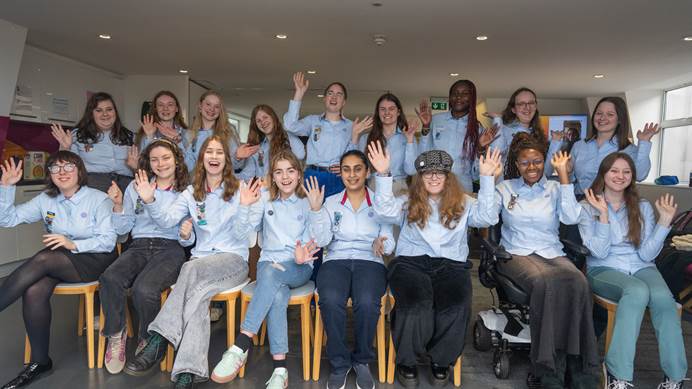Let's challenge the ‘boys will be boys’ attitude
Our advocates are campaigning to end sexual harassment in schools. Advocate Katie Horsburgh takes on the subject of gender stereotypes, and how the idea that ‘boys will be boys’ is making it especially hard to ensure schools are a safe space for girls
From catcalling to bum slapping to sexual coercion - sexual harassment has a huge impact on the lives of girls.
It knocks our confidence, reduces us to sexual objects, and prevents us from performing to our best ability at school, college and university.
According to the Girls' Attitudes Survey, a quarter of girls aged 11 to 16 consider not speaking out in class because they worry they might be sexually harrassed. It is definitely time that we challenge this difficult and growing issue. However, outdated attitudes - combined with dismissive responses from teachers - mean it’s hard to make any progress.
A lot of people seem to think that this behaviour from boys is inevitable. But by normalising harassment, we run the risk that girls will start to expect disrespect throughout their lives whether on the street, at a gig, or in a relationship.
Outdated attitudes
Having personally experienced sexual harassment in school, alongside my friends and fellow Girlguiding Advocates, it is clear that not enough is being done to deal with this problem. Many of us have reported instances of sexual harassment, only to have them brushed aside as ‘banter’. Teachers tell us to put up with it because, after all, ‘boys will be boys’.
In my experience, these responses push girls into accepting totally inappropriate behaviour. They encourage many girls to see sexual harassment as part of normal life or worse, as a compliment. And they also tar all teenage boys with one very outdated brush by implying that they are hormone-crazed creatures incapable of controlling themselves.
This is simply untrue. Many boys act in this hyper-sexualised, inappropriate manner because they think that ‘being a man’ means being domineering, aggressive and obsessed with sex. The pressure to fit into this narrow stereotype can be hugely upsetting and damaging especially since some boys, particularity those who identify as LGBT, also experience sexual harassment.
Girls deserve respect, and boys deserve the expectation that they are capable of being respectful (because they are).
Don’t blame girls
Most of the time, boys escape with no punishment for harassing girls, and instead we blame the victim. ‘Wear a longer school skirt’ and ‘don’t walk around school alone’ (yes - seriously) are common responses to our complaints.
We were told we had to wear long-sleeved tops and leggings for social dance class at school because it was a given that boys would leer at us and make us feel uncomfortable if we wore normal PE kit - Susie, 18
This really demonstrates the level to which girls are forced to take responsibility for their own abuse. This lack of blame and consequence leads boys to think that this type of behaviour is OK, when clearly it is not.
Take action
90% of girls and young women aged 13 to 21 agree that something needs to be done to prevent and deal with sexual harassment in schools.
Schools need to have a zero-tolerance approach to sexual harassment, with clear guidelines for teachers about how to resolve incidences as they happen, as well as how to respond appropriately when girls report them. Compulsory, high quality PSHE and Relationships and Sex Education has the potential to educate young people about boundaries, consent and what’s acceptable, paving the way for a brighter future for everybody.
But to make this future a reality, we need your help. Spend just two minutes signing and sharing our petition - and don’t forget to join the conversation on Twitter by telling us and decision-makers why this issue matters to you. Just tag @Girlguiding and use the hashtag #SexualHarassmentInSchools.
Let’s tackle these damaging stereotypes and dismissive attitudes – and create a world where girls feel safe and respected.
Read more about the Advocates' campaign
We're calling on governments to take action to prevent and tackle sexual harassment in all schools.



